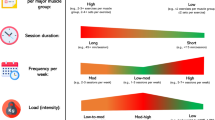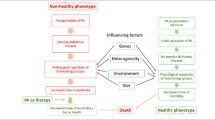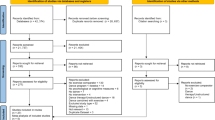Abstract
In this pilot study, we investigate whether a routine cycle ergometry training programme has therapeutic potential in individuals with multiple sclerosis (MS) by improving quality of life (QOL) and depressive symptomatology, while ameliorating cognitive disturbances. Healthy volunteers and MS patients cycled for 30 min at 65–75% age-predicted maximal heart rate on a recumbent ergometer, with this session repeated twice a week for 8 weeks. QOL, depressive symptomatology and cognitive function were assessed pre- and post-exercise using the MS Quality of Life-54 (MSQOL-54) questionnaire, 16-item Quick Inventory of Depressive Symptomatology (QIDS-SR16) questionnaire and the Cambridge Neuropsychological Test Automated Battery (CANTAB), respectively. We determined that QOL was lower in MS patients, compared to healthy subjects, with a reduction in physical and mental health summary scores observed. Exercise improved both physical and mental health scores in MS patients. In support of this, exercise was shown to reduce depressive symptomatology in MS patients. Exercise was also associated with an improvement in visual sustained attention, executive function/cognitive flexibility and hippocampal-dependent visuospatial memory in patients. Overall, this study identifies a short-term exercise programme that improves physical and mental health, while reducing depressive symptomatology and cognitive dysfunction in MS.


Similar content being viewed by others
References
Frohman EM, Racke MK, Raine CS (2006) Multiple sclerosis—the plaque and its pathogenesis. N Engl J Med 354(9):942–955. https://doi.org/10.1056/NEJMra052130
Briken S, Gold SM, Patra S, Vettorazzi E, Harbs D, Tallner A, Ketels G, Schulz KH, Heesen C (2014) Effects of exercise on fitness and cognition in progressive MS: a randomized, controlled pilot trial. Mult Scler 20(3):382–390. https://doi.org/10.1177/1352458513507358
Comabella M, Khoury SJ (2012) Immunopathogenesis of multiple sclerosis. Clin Immunol 142(1):2–8. https://doi.org/10.1016/j.clim.2011.03.004
Rubin SM (2013) Management of multiple sclerosis: an overview. Dis Mon 59(7):253–260. https://doi.org/10.1016/j.disamonth.2013.03.012
Minagar A (2013) Current and future therapies for multiple sclerosis. Scientifica 2013:249101–249111. https://doi.org/10.1155/2013/249101
Graber JJ, McGraw CA, Kimbrough D, Dhib-Jalbut S (2010) Overlapping and distinct mechanisms of action of multiple sclerosis therapies. Clin Neurol Neurosurg 112(7):583–591. https://doi.org/10.1016/j.clineuro.2010.05.002
Morrison JD, Mayer L (2016) Physical activity and cognitive function in adults with multiple sclerosis: an integrative review. Disabil Rehabil 39(19):1–12. https://doi.org/10.1080/09638288.2016.1213900
Bechara RG, Lyne R, Kelly AM (2013) BDNF-stimulated intracellular signaling mechanisms underlie exercise-induced improvement in spatial memory in the male Wistar rat. Behav Brain Res 275:297–306. https://doi.org/10.1016/j.bbr.2013.11.015
Rossi S, Furlan R, De Chiara V, Musella A, Lo Giudice T, Mataluni G, Cavasinni F, Cantarella C, Bernardi G, Muzio L, Martorana A, Martino G, Centonze D (2009) Exercise attenuates the clinical, synaptic and dendritic abnormalities of experimental autoimmune encephalomyelitis. Neurobiol Dis 36(1):51–59. https://doi.org/10.1016/j.nbd.2009.06.013
Bernardes D, Oliveira-Lima OC, da Silva TV, Faraco CC, Leite HR, Juliano MA, Dos Santos DM, Bethea JR, Brambilla R, Orian JM, Arantes RM, Carvalho-Tavares J (2013) Differential brain and spinal cord cytokine and BDNF levels in experimental autoimmune encephalomyelitis are modulated by prior and regular exercise. J Neuroimmunol 264(1–2):24–34. https://doi.org/10.1016/j.jneuroim.2013.08.014
Rampello A, Franceschini M, Piepoli M, Antenucci R, Lenti G, Olivieri D, Chetta A (2007) Effect of aerobic training on walking capacity and maximal exercise tolerance in patients with multiple sclerosis: a randomized crossover controlled study. Phys Ther 87(5):545–555. https://doi.org/10.2522/ptj.20060085
Petajan JH, Gappmaier E, White AT, Spencer MK, Mino L, Hicks RW (1996) Impact of aerobic training on fitness and quality of life in multiple sclerosis. Ann Neurol 39(4):432–441. https://doi.org/10.1002/ana.410390405
Learmonth YC, Paul L, McFadyen AK, Marshall-McKenna R, Mattison P, Miller L, McFarlane NG (2014) Short-term effect of aerobic exercise on symptoms in multiple sclerosis and chronic fatigue syndrome: a pilot study. Int J MS Care 16(2):76–82. https://doi.org/10.7224/1537-2073.2013-005
Barry A, Cronin O, Ryan AM, Sweeney B, Yap SM, O’Toole O, Allen AP, Clarke G, O’Halloran KD, Downer EJ (2016) Impact of exercise on innate immunity in multiple sclerosis progression and symptomatology. Front Physiol 7:194. https://doi.org/10.3389/fphys.2016.00194
Kurtzke JF (1983) Rating neurologic impairment in multiple sclerosis: an expanded disability status scale (EDSS). Neurology 33(11):1444–1452. https://doi.org/10.1212/WNL.33.11.1444
Polman CH, Reingold SC, Banwell B, Clanet M, Cohen JA, Filippi M, Fujihara K, Havrdova E, Hutchinson M, Kappos L, Lublin FD, Montalban X, O'Connor P, Sandberg-Wollheim M, Thompson AJ, Waubant E, Weinshenker B, Wolinsky JS (2011) Diagnostic criteria for multiple sclerosis: 2010 revisions to the McDonald criteria. Ann Neurol 69(2):292–302. https://doi.org/10.1002/ana.22366
Kruger T, Behrens JR, Grobelny A, Otte K, Mansow-Model S, Kayser B, Bellmann-Strobl J, Brandt AU, Paul F, Schmitz-Hubsch T (2017) Subjective and objective assessment of physical activity in multiple sclerosis and their relation to health-related quality of life. BMC Neurol 17(1):10. https://doi.org/10.1186/s12883-016-0783-0
Astrand PO, Ryhming I (1954) A nomogram for calculation of aerobic capacity (physical fitness) from pulse rate during sub-maximal work. J Appl Physiol 7(2):218–221. https://doi.org/10.1152/jappl.1954.7.2.218
Vickrey BG, Hays RD, Harooni R, Myers LW, Ellison GW (1995) A health-related quality of life measure for multiple sclerosis. Qual Life Res 4(3):187–206. https://doi.org/10.1007/BF02260859
Fischer A, Fischer M, Nicholls RA, Lau S, Poettgen J, Patas K, Heesen C, Gold SM (2015) Diagnostic accuracy for major depression in multiple sclerosis using self-report questionnaires. Brain Behav 5(9):e00365. https://doi.org/10.1002/brb3.365
Allen AP, Hutch W, Borre YE, Kennedy PJ, Temko A, Boylan G, Murphy E, Cryan JF, Dinan TG, Clarke G (2016) Bifidobacterium longum 1714 as a translational psychobiotic: modulation of stress, electrophysiology and neurocognition in healthy volunteers. Transl Psychiatry 6(11):e939. https://doi.org/10.1038/tp.2016.191
Kelly JR, Allen AP, Temko A, Hutch W, Kennedy PJ, Farid N, Murphy E, Boylan G, Bienenstock J, Cryan JF, Clarke G, Dinan TG (2017) Lost in translation? The potential psychobiotic Lactobacillus rhamnosus (JB-1) fails to modulate stress or cognitive performance in healthy male subjects. Brain Behav Immun 61:50–59. https://doi.org/10.1016/j.bbi.2016.11.018
Motl RW, McAuley E, Snook EM, Gliottoni RC (2009) Physical activity and quality of life in multiple sclerosis: intermediary roles of disability, fatigue, mood, pain, self-efficacy and social support. Psychol Health Med 14(1):111–124. https://doi.org/10.1080/13548500802241902
Krupp LB, Alvarez LA, LaRocca NG, Scheinberg LC (1988) Fatigue in multiple sclerosis. Arch Neurol 45(4):435–437. https://doi.org/10.1001/archneur.1988.00520280085020
O’Connor AB, Schwid SR, Herrmann DN, Markman JD, Dworkin RH (2008) Pain associated with multiple sclerosis: systematic review and proposed classification. Pain 137(1):96–111. https://doi.org/10.1016/j.pain.2007.08.024
Golzari Z, Shabkhiz F, Soudi S, Kordi MR, Hashemi SM (2010) Combined exercise training reduces IFN-gamma and IL-17 levels in the plasma and the supernatant of peripheral blood mononuclear cells in women with multiple sclerosis. Int Immunopharmacol 10(11):1415–1419. https://doi.org/10.1016/j.intimp.2010.08.008
Ahmadi A, Arastoo AA, Nikbakht M, Zahednejad S, Rajabpour M (2013) Comparison of the effect of 8 weeks aerobic and yoga training on ambulatory function, fatigue and mood status in MS patients. Iran Red Crescent Med J 15(6):449–454. https://doi.org/10.5812/ircmj.3597
Leavitt VM, Cirnigliaro C, Cohen A, Farag A, Brooks M, Wecht JM, Wylie GR, Chiaravalloti ND, DeLuca J, Sumowski JF (2014) Aerobic exercise increases hippocampal volume and improves memory in multiple sclerosis: preliminary findings. Neurocase 20(6):695–697. https://doi.org/10.1080/13554794.2013.841951
Janardhan V, Bakshi R (2002) Quality of life in patients with multiple sclerosis: the impact of fatigue and depression. J Neurol Sci 205(1):51–58. https://doi.org/10.1016/S0022-510X(02)00312-X
Simpson RJ, McLean G, Guthrie B, Mair F, Mercer SW (2014) Physical and mental health comorbidity is common in people with multiple sclerosis: nationally representative cross-sectional population database analysis. BMC Neurol 14(1):128. https://doi.org/10.1186/1471-2377-14-128
Levin AB, Hadgkiss EJ, Weiland TJ, Marck CH, van der Meer DM, Pereira NG, Jelinek GA (2014) (2014) Can meditation influence quality of life, depression, and disease outcome in multiple sclerosis? Findings from a large international web-based study. Behav Neurol:916519. https://doi.org/10.1155/2014/916519, 1, 9
Bogosian A, Chadwick P, Windgassen S, Norton S, McCrone P, Mosweu I, Silber E, Moss-Morris R (2015) Distress improves after mindfulness training for progressive MS: a pilot randomised trial. Mult Scler 21(9):1184–1194. https://doi.org/10.1177/1352458515576261
Burschka JM, Keune PM, Oy UH, Oschmann P, Kuhn P (2014) Mindfulness-based interventions in multiple sclerosis: beneficial effects of Tai Chi on balance, coordination, fatigue and depression. BMC Neurol 14(1):165. https://doi.org/10.1186/s12883-014-0165-4
Mohr DC, Lovera J, Brown T, Cohen B, Neylan T, Henry R, Siddique J, Jin L, Daikh D, Pelletier D (2012) A randomized trial of stress management for the prevention of new brain lesions in MS. Neurology 79(5):412–419. https://doi.org/10.1212/WNL.0b013e3182616ff9
Mitsonis CI, Zervas IM, Mitropoulos PA, Dimopoulos NP, Soldatos CR, Potagas CM, Sfagos CA (2008) The impact of stressful life events on risk of relapse in women with multiple sclerosis: a prospective study. European psychiatry: the journal of the Association of European Psychiatrists 23(7):497–504. https://doi.org/10.1016/j.eurpsy.2008.06.003
Achiron A, Polliack M, Rao SM, Barak Y, Lavie M, Appelboim N, Harel Y (2005) Cognitive patterns and progression in multiple sclerosis: construction and validation of percentile curves. J Neurol Neurosurg Psychiatry 76(5):744–749. https://doi.org/10.1136/jnnp.2004.045518
Labiano-Fontcuberta A, Mitchell AJ, Moreno-Garcia S, Benito-Leon J (2014) Cognitive impairment in patients with multiple sclerosis predicts worse caregiver’s health-related quality of life. Mult Scler 20(13):1769–1779. https://doi.org/10.1177/1352458514532398
De Stefano N, Giorgio A, Battaglini M, Rovaris M, Sormani MP, Barkhof F, Korteweg T, Enzinger C, Fazekas F, Calabrese M, Dinacci D, Tedeschi G, Gass A, Montalban X, Rovira A, Thompson A, Comi G, Miller DH, Filippi M (2010) Assessing brain atrophy rates in a large population of untreated multiple sclerosis subtypes. Neurology 74(23):1868–1876. https://doi.org/10.1212/WNL.0b013e3181e24136
Filippi M (2015) MRI measures of neurodegeneration in multiple sclerosis: implications for disability, disease monitoring, and treatment. J Neurol 262(1):1–6. https://doi.org/10.1007/s00415-014-7340-9
Sicotte NL, Kern KC, Giesser BS, Arshanapalli A, Schultz A, Montag M, Wang H, Bookheimer SY (2008) Regional hippocampal atrophy in multiple sclerosis. Brain 131(Pt 4):1134–1141. https://doi.org/10.1093/brain/awn030
Acknowledgements
The authors thank all participating subjects in this study.
Funding
The authors acknowledge grant support from the Physiological Society (to EJD), the UCC School of Medicine Translational Research Access Programme (to EJD and OOT) and the UCC Strategic Research Fund (to EJD towards purchase of a recumbent ergometer and to GC towards purchase of CANTAB). AB was supported by the Department of Physiology, UCC. GC and APA are based in the APC Microbiome Institute, a research institute supported by Science Foundation Ireland (Grant Number 12/RC/2273).
Author information
Authors and Affiliations
Corresponding author
Ethics declarations
Written informed consent was obtained from each participant and the study received ethical approval from the Clinical Research Ethics committee of the Cork Teaching Hospitals (ECM 3 (xxxxx) 14/04/15 and 4 (o) 01/07/14). The study conformed to the standards set by the Declaration of Helsinki, except for registration in a database.
Conflict of interest
The authors declare that they have no conflicts of interest.
Rights and permissions
About this article
Cite this article
Barry, A., Cronin, O., Ryan, A.M. et al. Impact of short-term cycle ergometer training on quality of life, cognition and depressive symptomatology in multiple sclerosis patients: a pilot study. Neurol Sci 39, 461–469 (2018). https://doi.org/10.1007/s10072-017-3230-0
Received:
Accepted:
Published:
Issue Date:
DOI: https://doi.org/10.1007/s10072-017-3230-0




